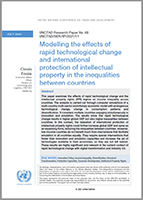
This paper examines the effects of rapid technological change and the intellectual property rights (IPR) regime on income inequality across countries.
The analysis is carried out through computer simulations of a multi-country multi-sector evolutionary economic model with endogenous technological change, change in consumption patterns and diversification.
It considers multiple countries engaging simultaneously in innovation and emulation. The results show that rapid technological change results in higher global GDP but also higher inequalities between countries.
In this context, the relaxation of international protection of intellectual property rights could further increase global GDP and serve as an equalizing force, reducing the inequalities between countries. However, low-income countries do not benefit much from mechanisms that facilitate emulation in all countries equally.
They require special interventions that foster their innovation and emulation capacities and increase the set of technologies available in their economies, so they are not left behind.
These results are highly significant and relevant in the current context of rapid technological change with digital transformation and Industry 4.0.




